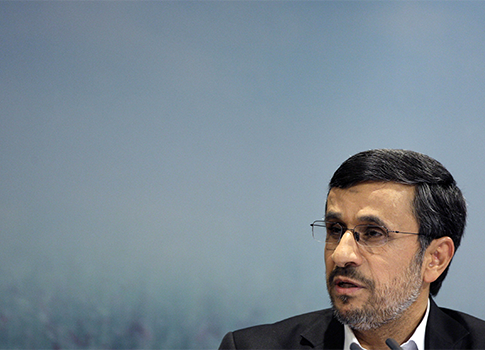The recent collapse of Iran’s currency has led foreign policy experts to caution President Barack Obama’s administration against declarations that economic sanctions are the key to ending Tehran’s clandestine nuclear arms program.
Protests erupted in Tehran’s largest marketplace last week after Iran’s currency, the rial, plunged in value and lost about 40 percent of its worth against the U.S. dollar, according to reports.
The economic crisis led Obama administration officials to speculate that economic sanctions have reached a tipping point that could prompt the regime to cede its nuclear program.
Iran experts are skeptical of this view, however. They believe that economic sanctions alone cannot force Iran’s insulated leadership to reverse its nuclear course—and that sanctions could be accelerating Tehran’s nuclear ambitions.
"Sanctions are actually serving not just to collapse the Iranian economy, but to accelerate Iran’s nuclear program," Clare Lopez, a former CIA operations officer, told the Washington Free Beacon.
Intelligence reports, including those issued by the International Atomic Energy Agency, show that Iran has accelerated its nuclear weapons-related research since last year. This is an indication that Tehran is rushing to build a nuke before sanctions ravage its economy, Lopez said.
"It’s a do or die" situation, Lopez said. Iran’s senior leadership is "going to drive all out and double down before the West can shut them down."
"It’s a race," she noted, between Western sanctions and Iran’s nuclear scientists.
It is a tactical mistake for the Obama administration to rely solely on sanctions to solve the nuclear puzzle, according to Michael Singh, a former senior director for Middle East affairs at the National Security Council.
"The regime is relatively sheltered from the current crisis, so Washington should be careful not to count on the sanctions alone," Singh, managing director of the Washington Institute for Near East Policy, wrote in a recent essay.
Iran’s economy has faltered due to a number of factors of which sanctions are just a part—despite the Obama administration’s statements otherwise, Singh maintained.
"Both the Obama administration and Iran's President Ahmadinejad have blamed the recent dramatic fall in value of Iran's currency on international sanctions," Singh wrote. "It is a convenient explanation for both—for the White House, it suggests that U.S. strategy towards Iran is working; for Ahmadinejad, it deflects responsibility away from his own policy decisions and toward an external scapegoat."
However, "sanctions are only party to blame for Iran’s economic travails," Singh argued. "The currency crises and associated inflationary spiral has its origins in the Ahmadinejad government’s mismanaged subsidy reform initiative," as well as several other factors.
Widespread government corruption has actually shielded Tehran’s ruling class, Singh wrote.
"Iran’s [current] economic crisis is unlikely to directly cause the regime to change its nuclear calculus," wrote Singh, especially since oil revenues in the country are on the rise, with exports reaching 1 million barrels a day, according to reports.
Iranian citizens are paying the price for their government’s ineptitude, analysts say.
Food prices, for instance, have skyrocketed since last year, leading to discontent on the Iranian street, according to multiple reports.
Basic goods such as peas, rice, and beans—all staples of the Persian diet—have become extremely expensive, according to a June report issued by the U.S. Army’s Foreign Military Studies Office (FMSO).
With the rial dipping even further in value last week, food prices have likely shot even higher, fueling social unrest.
Economic discontent remains the principal path to bringing down Iran’s hardline rulers, though the journey will be lengthy and unpredictable, observers said.
"You’re seeing protests, economic duress in the streets," Mark Wallace, a former ambassador to the United Nations, told the Free Beacon. "In Iran there’s a unique opportunity" to foster regime change.
"The Iranian on the street is very pro–western and educated, very modern," said Wallace, CEO of United Against Nuclear Iran (UANI), a nonpartisan policy group. "They’re very vulnerable to economic pressure."
While food prices have spiked, Iranians "are not really hungry or lacking in the basics of food yet," noted Lopez, who currently serves as a senior fellow at the Center for Security Policy.
To quicken the pace of a potential revolt, sanctions should be tightened and refined, said UANI’s Wallace.
"There should be a full economic embargo," he said. "We could do more."
The Obama administration and Senate Democrats have a history of working to weaken Iran sanctions, however.
The impasse in the U.S. over the proper degree of sanctions has allowed Iran to continue its nuclear work.
"I feel the clock is running out," Wallace said. "I think that the timeframe is much shorter" than it was just last year.
Iran’s current economic unrest is a reassuring sign, though Wallace had hoped this would happen "a year ago" when Iran’s nuclear program was less advanced.
One Iran expert blamed the Obama administration for holding up sanctions and wasting time.
"The opposite of everything the Obama administration predicted has come true, and the sanctions Obama opposed are the reason we see the Iranian currency collapsing," said the expert, who requested anonymity. "Had the administration not fought to water down the last Iran sanctions bill, Iran might actually now be on the verge of economic collapse."
